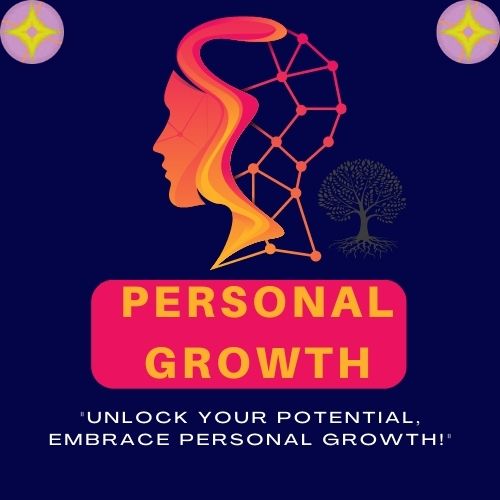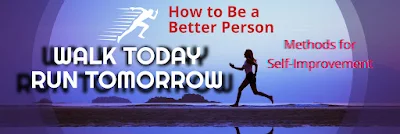How to Be a Better Person: 15 Best Methods for Self-Improvement
How a person becomes better. Let us discuss the 15 best ways we can use for self-improvement. You know that this website always gives you ideas and tips about personal growth, self-development, and personal development. Becoming a better person is a journey of self-discovery and continuous growth. It involves recognizing your values, working on accountability, seeking therapy, and practicing self-reflection. In this blog post, we will explore the top effective methods for self-improvement.
Step 1: Identify Your Values:
Understanding your values is the foundation of personal growth. Take the time to reflect on what truly matters to you. These core beliefs shape your decisions, actions, and relationships. When you align your life with your values, you'll experience a sense of purpose and fulfillment.
Step 2: Try Journaling:
Journaling is a powerful tool for self-awareness and emotional release. Keeping a journal can help you process your thoughts, emotions, and experiences. Write about your achievements, challenges, and aspirations. It will enable you to track your progress and identify areas for improvement.
Step 3: Work on Accountability:
Being accountable for your actions means taking responsibility for the consequences they bring. Acknowledge your mistakes and learn from them. Surround yourself with supportive individuals who can provide constructive feedback and hold you accountable for your goals.
Step 4: Seek Therapy:
Therapy is not a sign of weakness; it is a proactive step toward personal growth. A qualified therapist can help you navigate challenges, address deep-rooted issues, and develop coping mechanisms. Embracing therapy can lead to greater self-awareness and improved mental well-being.
Step 5: Practice Self-Reflection:
Regular self-reflection allows you to evaluate your actions and behaviors objectively. Consider the impact of your choices on yourself and others. Identify areas where you can make positive changes and continuously strive to grow.
Step 6: Keep Learning:
Embrace a growth mindset by prioritizing continuous learning. Take up new courses, read books, listen to podcasts, or attend workshops. Learning enhances your knowledge, widens your perspective, and opens up new opportunities for personal and professional development.
Step 7: Give Back:
Giving back to the community can be incredibly fulfilling. Engage in volunteer work or charitable activities aligned with your values. By making a positive impact on others' lives, you'll find a deeper sense of purpose and happiness.
Step 8: Improve Communication:
Effective communication is key to building strong relationships. Practice active listening, empathy, and clear expression of thoughts and emotions. Good communication fosters understanding, trust, and healthy connections with others.
Step 9: Prioritize Your Loved Ones:
Nurture your relationships with family and friends. Spend quality time with them, show appreciation, and offer support when needed. Healthy relationships provide a strong support system and contribute significantly to personal growth.
Step 10: Practice Forgiveness:
Practice forgiveness is a powerful act of compassion and self-healing. It involves letting go of resentment, grudges, or anger toward those who have hurt or wronged us. Forgiveness does not mean condoning the actions of others, but rather freeing ourselves from the emotional burdens that weigh us down. By forgiving, we release negative emotions and open the door to emotional healing and personal growth. It allows us to break free from the past, offering a chance to move forward with a lighter heart and a more positive outlook. Moreover, practicing forgiveness not only benefits ourselves but also contributes to fostering healthier relationships and creating a more harmonious and understanding world.
Letting go of grudges and practicing forgiveness is liberating. Forgive yourself for past mistakes and forgive others who may have hurt you. By doing so, you free yourself from emotional burdens, fostering a positive mindset and a healthier emotional state.
Step 11: Change Your Perspective:
Challenge negative thought patterns and adopt a positive outlook on life. See setbacks as opportunities for growth and view challenges as stepping stones to success. Changing your perspective can lead to increased resilience and a more optimistic attitude.
Step 12: Try New Things:
Trying new things can lead to exciting and unexpected adventures. For instance, imagine a person who has always been a bit reserved and hesitant to explore unfamiliar activities. One day, they decide to break out of their comfort zone and sign up for a salsa dance class. At first, they may feel a bit awkward and unsure, but as they continue attending the classes, they begin to embrace the rhythm and movement. Through this new experience, they meet like-minded people, build new friendships, and discover a newfound passion for dancing. This decision to try something new not only enriched their life with joy and fulfillment but also opened the door to a whole new world of possibilities they never imagined before.
Stepping out of your comfort zone allows for personal growth and development. Embrace new experiences, hobbies, or activities that pique your interest. These experiences can lead to self-discovery and expand your horizons.
Step 13: Stay Kind to Yourself:
Practice self-compassion and avoid self-criticism. Treat yourself with the same kindness and understanding that you would extend to a friend. Accept that you are not perfect and embrace your imperfections as part of your unique journey.
Step 14: Be Empathic:
Develop empathy by trying to understand others' perspectives and emotions. Empathy fosters stronger connections with others and enhances your ability to support and care for those around you.
Step 15: Manage Stress:
Stress management is the practice of adopting strategies and techniques to cope with and reduce the impact of stress on our physical and mental well-being. In our fast-paced and demanding lives, stress is a natural response to the challenges and pressures we encounter. However, chronic stress can lead to adverse effects on our health and overall quality of life. Effective stress management involves identifying stressors, implementing healthy coping mechanisms like mindfulness, exercise, and relaxation techniques, and seeking support from friends, family, or professionals when needed. By proactively managing stress, we can maintain a balanced and resilient outlook, enhancing our ability to navigate life's challenges with greater ease and maintaining a healthier lifestyle.
Stress is inevitable, but managing it is crucial for personal well-being. Find healthy coping mechanisms such as meditation, exercise, or spending time in nature. Prioritize self-care to maintain a balanced and positive mindset.
Conclusion
Becoming a better person is a continuous process that requires dedication and self-awareness. By following these fifteen methods for self-improvement, you can embark on a transformative journey of personal growth. Remember, the path to greatness lies within you, and with the support of AI-powered tools and content, you can make significant strides toward becoming the best version of yourself.
For more information please follow our Facebook Page.


.jpeg)
.jpeg)